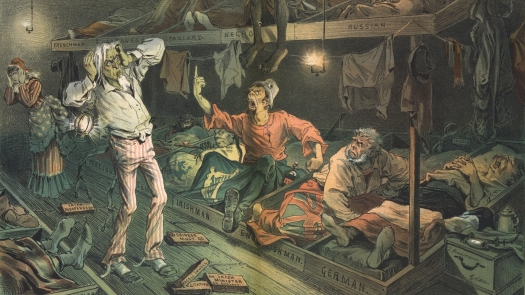
Nearly four-fifths of the whole emigration are, accordingly, to be regarded as belonging to the Celtic population of Ireland and of the Highlands and islands of Scotland. The London Economist says of this emigration:
“It is consequent on the breaking down of the system of society founded on small holdings and potato cultivation;” and adds: “The departure of the redundant part of the population of Ireland and the Highlands of Scotland is an indispensable preliminary to every kind of improvement. .The revenue of Ireland has not suffered in any degree from the famine of 1846-47, or from the emigration that has since taken place. On the contrary, her net revenue amounted in 1851 to £4,281,999, being about £184,000 greater than in 1843.”
Begin with pauperising the inhabitants of a country, and when there is no more profit to be ground out of them, when they have grown a burden to the revenue, drive them away, and sum up your Net Revenue! Such is the doctrine laid down by Ricardo, in his celebrated work, “The Principle of Political Economy.” The annual profits of a capitalist amounting to £2,000, what does it matter to him whether he employs 100 men or 1,000 men? “Is not,” says Ricardo, “the real income of a nation similar?” The net real income of a nation, rents and profits, remaining the same, it is no subject of consideration whether it is derived from ten millions of people or from twelve millions. Sismondi, in his “Nouveaux Principes d’Economie Politique,” answers that, according to this view of the matter, the English nation would not be interested at all in the disappearance of the whole population, the King (at that time it was no Queen, but a King) remaining alone in the midst of the island, supposing only that automatic machinery enabled him to procure the amount of net revenue now produced by a population of twenty millions. Indeed that grammatical entity, “the national wealth,” would in this case not be diminished.
But it is not only the pauperised inhabitants of Green Erin [Ireland] and of the Highlands of Scotland that are swept away by agricultural improvements, and by the “breaking down of the antiquated system of society.” It is not only the able-bodied agricultural labourers from England, Wales, and Lower Scotland, whose passages are paid by the Emigration Commissioners. The wheel of “improvement” is now seizing another class, the most stationary class in England. A startling emigration movement has sprung up among the smaller English farmers, especially those holding heavy clay soils, who, with bad prospects for the coming harvest, and in want of sufficient capital to make the great improvements on their farms which would enable them to pay their old rents, have no other alternative but to cross the sea in search of a new country and of new lands, I am not speaking now of the emigration caused by the gold mania, but only of the compulsory emigration produced by landlordism, concentration of farms, application of machinery to the soil, and introduction of the modern system of agriculture on a great scale.
In the ancient States, in Greece and Rome, compulsory emigration, assuming the shape of the periodical establishment of colonies, formed a regular link in the structure of society. The whole system of those States was founded on certain limits to the numbers of the population, which could not be surpassed without endangering the condition of antique civilisation itself. But why was it so? Because the application of science to material production was utterly unknown to them. To remain civilised they were forced to remain few. Otherwise they would have had to submit to the bodily drudgery which transformed the free citizen into a slave. The want of productive power made citizenship dependent on a certain proportion in numbers not to be disturbed. Forced emigration was the only remedy.
It was the same pressure of population on the powers of production. that drove the barbarians from the high plains of Asia to invade the Old World. The same cause acted there, although under a different form. To remain barbarians they were forced to remain few. They were pastoral, hunting, war-waging tribes, whose manners of production required a large space for every individual, as is now the case with the Indian tribes in North-America. By augmenting in numbers they curtailed each other’s field of production. Thus the surplus population was forced to undertake those great adventurous migratory movements which laid the foundation of the peoples of ancient and modern Europe.
But with modern compulsory emigration the case stands quite opposite. Here it is not the want of productive. power which creates a surplus population; it is the increase of productive power which demands a diminution of population, and drives away the surplus by famine or emigration. It is not population that presses on productive power; it is productive power that presses on population.
by Karl Marx

